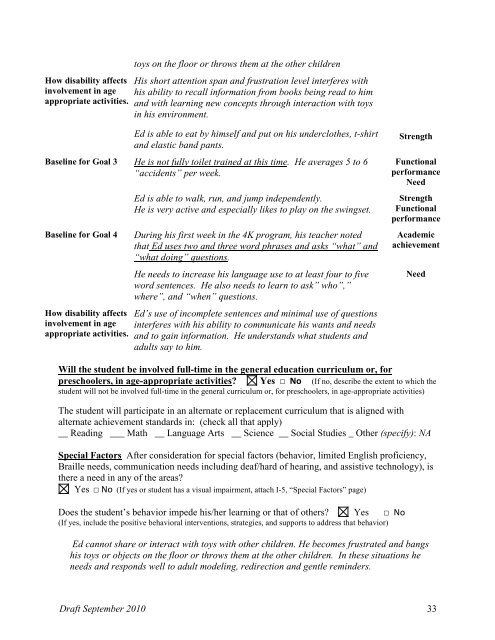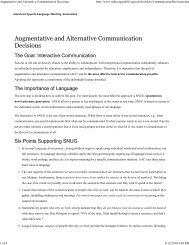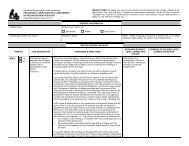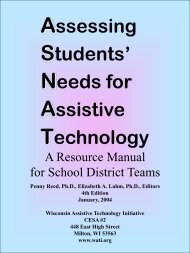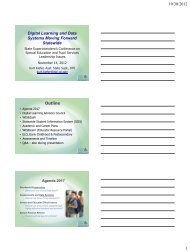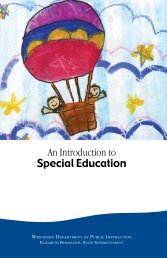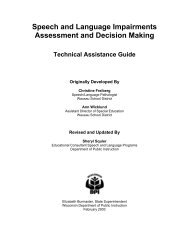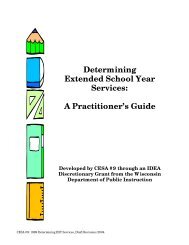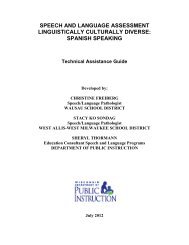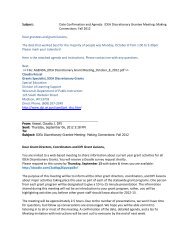Guide for Writing IEPs - The Special Education Team - Wisconsin.gov
Guide for Writing IEPs - The Special Education Team - Wisconsin.gov
Guide for Writing IEPs - The Special Education Team - Wisconsin.gov
Create successful ePaper yourself
Turn your PDF publications into a flip-book with our unique Google optimized e-Paper software.
How disability affects<br />
involvement in age<br />
appropriate activities.<br />
toys on the floor or throws them at the other children<br />
His short attention span and frustration level interferes with<br />
his ability to recall in<strong>for</strong>mation from books being read to him<br />
and with learning new concepts through interaction with toys<br />
in his environment.<br />
Ed is able to eat by himself and put on his underclothes, t-shirt<br />
and elastic band pants.<br />
Baseline <strong>for</strong> Goal 3 He is not fully toilet trained at this time. He averages 5 to 6<br />
“accidents” per week.<br />
Baseline <strong>for</strong> Goal 4<br />
How disability affects<br />
involvement in age<br />
appropriate activities.<br />
Ed is able to walk, run, and jump independently.<br />
He is very active and especially likes to play on the swingset.<br />
During his first week in the 4K program, his teacher noted<br />
that Ed uses two and three word phrases and asks “what” and<br />
“what doing” questions.<br />
He needs to increase his language use to at least four to five<br />
word sentences. He also needs to learn to ask” who”,”<br />
where”, and “when” questions.<br />
Ed’s use of incomplete sentences and minimal use of questions<br />
interferes with his ability to communicate his wants and needs<br />
and to gain in<strong>for</strong>mation. He understands what students and<br />
adults say to him.<br />
Strength<br />
Functional<br />
per<strong>for</strong>mance<br />
Need<br />
Strength<br />
Functional<br />
per<strong>for</strong>mance<br />
Academic<br />
achievement<br />
Need<br />
Will the student be involved full-time in the general education curriculum or, <strong>for</strong><br />
preschoolers, in age-appropriate activities? Yes □ No (If no, describe the extent to which the<br />
student will not be involved full-time in the general curriculum or, <strong>for</strong> preschoolers, in age-appropriate activities)<br />
<strong>The</strong> student will participate in an alternate or replacement curriculum that is aligned with<br />
alternate achievement standards in: (check all that apply)<br />
__ Reading ___ Math __ Language Arts __ Science __ Social Studies _ Other (specify): NA<br />
<strong>Special</strong> Factors After consideration <strong>for</strong> special factors (behavior, limited English proficiency,<br />
Braille needs, communication needs including deaf/hard of hearing, and assistive technology), is<br />
there a need in any of the areas?<br />
Yes □ No (If yes or student has a visual impairment, attach I-5, “<strong>Special</strong> Factors” page)<br />
Does the student’s behavior impede his/her learning or that of others? Yes □ No<br />
(If yes, include the positive behavioral interventions, strategies, and supports to address that behavior)<br />
Ed cannot share or interact with toys with other children. He becomes frustrated and bangs<br />
his toys or objects on the floor or throws them at the other children. In these situations he<br />
needs and responds well to adult modeling, redirection and gentle reminders.<br />
Draft September 2010 33


